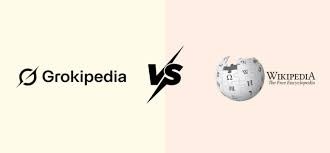Gone Wikipedia, Enter Grokipedia?
From Collective Knowledge to Algorithmic Chaos
Dr.Tarek Cherkaoui
11/8/20254 min read


In the early 2000s, Wikipedia revolutionized the way humanity learns. It embodied what French philosopher Pierre Lévy once called collective intelligence—a “universally distributed intelligence” that could empower individuals, dissolve hierarchies of knowledge, and democratize participation. For a time, this vision seemed within reach: millions collaborated to build the world’s largest shared repository of knowledge.
But that dream is now facing its hardest test. Enter Grokipedia, Elon Musk’s new project, which already boasts nearly 900,000 articles and claims to “purify” knowledge by challenging what Musk calls a “left-leaning bias” in Wikipedia. After dismantling moderation on X, amplifying extreme content, and unleashing unfiltered AI tools, Musk’s latest venture represents a new stage in the privatization of truth—where algorithms, not communities, decide what we know.
If Wikipedia buried the paper encyclopedia, could Grokipedia, driven by AI and ideology, now bury the open web’s last utopian promise?
The Limits of “Collective Intelligence”
Pierre Lévy advocated for a digital commons where knowledge would circulate freely and inclusively. However, his theory underestimated significantly the structural inequalities shaping online participation. In practice, digital networks have not erased hierarchies—they have reproduced and reconfigured them. Platforms like Wikipedia, while open, remain influenced by elites, commercial interests, and now, algorithmic gatekeepers.
Pierre Lévy’s vision of collective intelligence, though inspiring, was normatively optimistic — assuming a level playing field of participation that rarely exists in practice. It did not fully account for the realities of commercialization and platform control, all of which determine whose voices are heard and whose knowledge is sidelined. What he saw as an emancipatory network of minds has, in many ways, become a market of attention, governed less by collective reasoning than by engagement metrics. Grokipedia’s rise only sharpens this contradiction: instead of widening participation, it risks fragmenting truth into competing ideological silos.
Wikipedia and Gaza: Selective Enforcement
In a move that exposed the precarious nature of Wikipedia’s claimed neutrality, co-founder Jimmy Wales personally intervened to shield the “Gaza genocide” article from further editing. His action, presented as a defense of editorial standards, functioned as a decisive act of political gatekeeping.
Wales singled out the article for presenting the term “Gaza genocide” as fact, demanding instead a formulation that equates the allegations with their rebuttals. By insisting the opening line must state that some bodies have “rejected the characterization,” he effectively mandated a false equivalence. This intervention ignored the legal proceedings at the International Court of Justice (ICJ), where a preliminary ruling found the risk of genocide to be plausible, and instead treated a matter of international legal scrutiny as a simple “he-said-she-said” debate.
Critically, this high-level intervention stands in stark contrast to Wikipedia’s typically minimalist interference. Wales’s action did not occur in a vacuum; it served to suppress a specific narrative that challenges Israeli state policy. By framing the very term “genocide” as inherently biased rather than a subject of legitimate legal and scholarly debate, his action effectively sided with the actors most frequently accused of wielding disproportionate influence over Western media narratives. This selective enforcement of “neutrality” reveals how the platform’s immense power can be wielded to arbitrate not just style, but the permissible boundaries of political discourse itself.
Wikipedia Under Pressure
It must be said that Wikipedia’s open model —“anyone can edit”— was once the backbone of digital democracy. But political interventionism and the AI revolution is straining that principle. Over the past year, Wikipedia’s traffic dropped by 8%, while its community of active editors declined by 35% since 2019. The Wikimedia Foundation blames the growing influence of AI and social media, which are changing how people seek and trust information.
The site’s openness is also being exploited by the very technologies it helped inspire. Bots and AI crawlers constantly harvest its pages to train large language models, overwhelming its servers with automated traffic. Meanwhile, the encyclopedia’s authority has made it a prime target for manipulation: fake news outlets and coordinated influence operations increasingly try to insert narratives into its ecosystem.
Conclusion: The Fragmentation of Truth
The promise of a universal digital commons, once embodied by Wikipedia, is fracturing. The platform now finds itself caught in a perfect storm: besieged by external forces like AI automation and coordinated disinformation, while its internal credibility is eroded by high-profile acts of political gatekeeping, as the Gaza article incident starkly illustrates. The ideal of a neutral, collective intelligence is buckling under the weight of geopolitical realities and the platform’s own unacknowledged power to set the boundaries of acceptable discourse.
Elon Musk’s Grokipedia represents the logical, terrifying next step: not the refinement of this model, but its rejection. It weaponizes the language of “bias” to advocate for a curated, ideologically pure alternative. Where Wikipedia’s crisis is one of inconsistent neutrality, Grokipedia’s founding principle is the end of neutrality altogether, replacing it with algorithmic amplification of a preferred worldview.
We are witnessing not the evolution of knowledge, but its balkanization. The 21st century may not be defined by a single, contested encyclopedia, but by a war of encyclopedias—competing platforms, each with its own curated facts, its own sanctioned narratives, and its own claim to truth. The dream of a shared foundation of knowledge is receding, replaced by the algorithmic chaos of personalized realities. The fall of Wikipedia would not mean the end of information, but the end of the ambition that we might all, collectively, be able to agree on what is real.